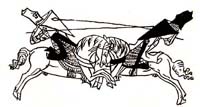 |
Polemics

 |
 |
The Myth of a Converted Russia Exposed |
 |
Marian T. Horvat, Ph.D
Published in Catholic Family News, February 2001
There is a myth that being spun in Catholic public opinion, a fable about the new springtime of graces blowing into Russia when Communism supposedly fell in 1980s. Catholic magazines like Inside the Vatican have played their part in nourishing the myth by featuring optimistic stories on great movements of religion and conversion, the fulfillment of the prophecies of Our Lady at Fatima in 1917 (Robert Moynihan, “Russia’s Future,” Feb. 2000, pp. 13-24).
Never mind that what is “emerging from the catacombs” are the Schismatic [Orthodox] Churches, not the Roman Catholic Faith. As Robert Moynihan points out with almost giddy enthusiasm in one of his lead stories last year, John Paul II deeply admires the spirituality of the Orthodox East. So he “desires the ‘conversion’ and ‘renewal’ of both the Roman Catholics and the Orthodox [Schismatics], and is at pains to ensure that the Orthodox view the re-emergence of the Roman Catholic Church in Russia not as a challenge or threat to Russian Orthodoxy.” He sees no problem that conversion to the Catholic Church has been relegated to a secondary plane, so that no barriers are raised to the “miracle” of full reunion with the Schismatics.
Further, as Moynihan reminds us, to achieve this end the Pontiff is prepared for compromise. So much so “that he has stated in his encyclical on ecumenism, Ut unum sint that he is willing to face every obstacle to reunion, including a reconsideration of the way his own Petrine office carries out its mission” (Ibid., pp. 14-15)
As for the new springtime graces, Moynihan assures us that the atheists and agnostics are looking for a new faith. The Schismatics are seeking a new purity, independence and confidence. The Catholic Church is reaching out to both. It is a rosy picture of renewal, conversion, and yes, even a time of peace for the world.
That is why it was surprising to recently come upon what I suspect is a much more realistic, and grim, picture of the religious reality in Russia. In an interview in the February 2001 Catholic World Report, Fr. Daniel Maurer of the Canons Regular of Jesus the Lord (CJD) spoke about the Russia he has seen during the last eight years he has spent in Vladivostok in the Russian Far East. According to the personal missionary experience of Fr. Maurer, more than 75 years of Communist repression and a godless society have not only thoroughly eradicated the Catholic presence from Russia, but also left despair, poverty, an amoral populace, and religious indifference. With no incentive to be honest or to work to improve one’s condition in life, the result has been literally “the killing of the spirit of the Russians,” said Fr. Maurer. They have even coined a word for this new species of human being that developed under Communism – the homo sovieticus.
Point one: his words prick the rosy bubble of the new springtime fable. Point two: his report also sadly reinforces the notion of a new idea of conversion and the missionary character of the Church supported by Vatican II and John Paul II.
The “post-Communist” reality – a bleak picture
What has been the result of the supposed death of Communism? According to Fr. Mauer, general hopelessness, a damaged sense of morals, and a lot of poverty. (During the financial crisis of 1998 when the bottom fell out from the ruble, people lost everything they had – for probably the third time since perestroika in late 1980s.) In a society where the faith was almost destroyed, morality has sunk to new low. Abortions abound, suicides have increased, and there are many more cases of sexually transmitted diseases. The same Russian who meets you on the street and genially offers directions and hospitality has no scruples about stealing your pocketbook. (There are bars on every window and doors with five locks everywhere). The spirit of initiative is broken and there is no quick repair job that can be applied. It’s too bad American atheists with all their comfortable theories about how religion is an artificial crutch can’t come and see what it is to live in a society without religion, Fr. Mauer comments wryly. It is a real hell on earth, a breeding bed for despair.
What about possibilities for conversion? Fr. Mauer seems realistic in his reply. The older people, who invested themselves more strongly in the ideology of Communism in the ‘20s and ‘30s, do not want to admit they were deceived. It is easier to believe that religion is the opium of people, and God does not exist. The youth are too apathetic to be moved by ideology or religious fervor; their primary concern is pragmatic: making money. The greatest interest in religion comes from people in their late 20s and 30s who are married with children, according to Fr. Mauer. However, even many of them would not resist a return to Communism if it would provide more stability and better economic opportunities. The result of the pragmatism of the communism system.
When Fr. Mauer and another priest arrived in Vladivostok in 1992, he found himself in a city of one million, with only six elderly women who could still remember being members of their Catholic Parish of the Most Holy Mother of God. The Catholic Church in the Far East had been persecuted to point of virtual extinction. After eight years, the number of parishioners has grown from six to 400, with only about 160 person at Sunday Mass. Hardly the new springtime of conversion.
And the situation of the Schismatic church? Statistics show now that about 54 percent of Russians are baptized Orthodox, but those practicing their faith are less that 1/10th of 1 percent. In Vladivostok, Fr. Mauer reports, the Communists destroyed all 28 Schismatic parishes in the city. Even though there are now five Schismatic parishes, there has been no rejuvenation or grand return to the Schismatic church. Because the Schismatic Church was so co-opted by the Communists, young people don’t want to join it, Fr. Mauer says. Further, many “problem people” – alcoholics, deviants, and the self-interested – were ordained and left a generally bad impression. Now they have to be weeded out.
The entrance of other denominations on the scene -- the Baptists, Seventh Day Adventists, Jehovah Witnesses and Mormons – is welcomed by Fr. Mauer in the new spirit of ecumenism [“The more the merrier,” he says. After all, they can help teach the basics of the Gospel and morality. Besides, he notes, the Russian soul is attracted to mysticism and the solemnity of the Catholic liturgy, so after a while Protestantism isn’t enough, and they seek out Catholics.]
This situation, a general disillusionment with the Schismatic institution and a vacuum in the religious sphere would suggest conditions for a great missionary effort on the part of the Catholic Church that could bear much fruit.
A new and shocking definition of conversion
But no, says Fr. Mauer, this is not the case at all, since conversion is no longer the primary mission of the missionaries. “John Paul II has told all missionaries going to Russia that we are forbidden to proselytize the Orthodox Christians,” he states complacently. “They [the Schismatics] are a true apostolic church, and rather than catching them, we should be praying for communion between the two churches.”
This stands in direct opposition to the age-old Catholic teaching where the Church instructed her sons and daughters to fight against “the perfidy of heretics and schismatics.” Until Vatican II, the goal of missions was to convert heretics, schismatics, Jews, and pagans from the errors they professed in order to bring them into the bosom of the Church. After Vatican II, missions came to signify a movement of the Church of openness toward heretics, schismatics, Jews and pagans – without asking for their conversion. As Fr. Mauer calmly states, proselytism is banned by the Pope himself. In the spirit of the new evangelization, the Church must adapt to others. Fr. Mauer’s words are an alarming indication of just deeply the new progressivist doctrine has been imbedded in good-willed but misguided missionaries.
What about the Fatima prophecy, in which Our Lady said that Russia would be converted? Yes, says the missionary priest, “but we don’t think it will be converted by becoming Roman Catholic. It was never a Roman Catholic country. … The conversion of Russia will certainly be through the Orthodox [Schismatic] Church. And then, we hope to have communion with the Orthodox Church. I don’t say union, but communion, because union in some people’s minds means they are coming back.” Therefore, union would mean the two patriarchs would accept one another again as equal brothers so that the Church will become one.
Behold the fruits of the Council’s opening toward other religions and the world: a false interpretation of the Message of Fatima and a relativization of the Faith. How can we explain an ecumenism that no longer seeks the conversion of heretics and schismatics and would have the Mother of God content with a return of Russia to a Schismatic church? What it does help to explain is the sparse apostolic fruit of John Paul II’s "new evangelization," in which there has been no widespread resurrection of Churches in either Western Europe or in the old Europe under communist domination, or even in Latin America.
A new primary goal of missionary work: Humanitarian not spiritual
If the primary effort of Catholic missionaries is not to convert, what is it then? If the aim of the Canons Regular of Jesus the Lord (including their first Russian novitiate) is not first and foremost to bring the scattered sheep back into the Catholic fold and secure for them the promise of eternal salvation, then what are they doing?
Fr. Mauer has an answer. To help man. They have a food program that feeds 50 people daily. They opened the first crisis pregnancy center in summer 1998 (thanks to US funding), and hope to open five more (with help from the Knights of Columbus). With this base, they hope to start an adoption center, as a response to the great number of abortions. Statistically, the average Russian woman will have eight abortion in her childbearing years, stated Fr. Mauer, although he believes the actual number is more like 12 abortions per woman (and he has spoken to women who have had as many as 25 abortions).
The reasons for these horrendous figures? Since other contraception methods have not been introduced or are not trusted, abortion is the cheapest way to limit your family size (and Russians live in tiny apartments or homes where more than one child is considered impractical and a terrible burden – the opposite of a healthy Catholic mentality). Abortions are free, and births are not (the average cost of a birth is $20, a monthly salary for the average earner). Society ostracizes a mother who would “give away” her child, but not one who kills her baby (the warped, illogical mentality that developed in the first “civilized” country to legalize abortion in 1921).
Permit me a final short commentary. These efforts to feed the hungry and to promote adoptions are indeed commendable and worthy missionary efforts. But in the post-Vatican II era, such humanitarian efforts have come to supercede the primary missionary goal: the conversion of souls. The spiritual aim of conversion is being overridden by purely humanitarian works. Thus, the maxim of Mother Theresa’s sisters and so many of Catholic Charities services today: We don’t do what we do because the people we serve are Catholic or because we want them to be Catholic. But because we are Christian. The notion behind this is that there is a greater good that converting a soul to the one true Church of God; it is to help humanity. And there is a greater body to which to belong than the Roman Catholic Church; it is this ubiquitous, superior, all-encompassing Christian body that somehow embraces the Catholic Church as well as all the other “religions.”
And here we have the Masonic utopic dream of the creation of a new society based on a logic quite different from those who burn with a zealous fire to convert souls, like the great St. Isaac Jogues, Fr. Juniper Serra, Fr. DeSmet, St. Francis Cabrini, and so many other heroic figures of our American missionary past. In the new world order a-borning, this kind of religious fervor has to be extinguished. It is human beings and the well being of the universe that will be the central concern.
Continued

Other Articles in the Polemic
 Handing Over the Symbolic Icon of Our Lady of Kazan Handing Over the Symbolic Icon of Our Lady of Kazan
Dr. Marian T. Horvat.
 Soul Editor Contends The Remnant Slandered Blue Army Soul Editor Contends The Remnant Slandered Blue Army
Letter to the Editor by Fr. Ladis J. Cizik, director of The Blue Army and editor of Soul magazine
 Dr. Horvat Explains Dr. Horvat Explains
Response to Fr. Cizik's letter
 Will John Paul II Return the Icon of Kazan to an Unconverted Russia Will John Paul II Return the Icon of Kazan to an Unconverted Russia
Dr. Marian Horvat
 Kazan, The End of the Story Kazan, The End of the Story
Atila Sinke Guimarães
 A Triple Betrayal of the Catholic Church A Triple Betrayal of the Catholic Church
Dr. Marian Horvat


|
Polemics | Home | News | | Books | CDs | Search | Contact Us

© 2002-
Tradition in Action, Inc. All Rights Reserved
|
 |
|
